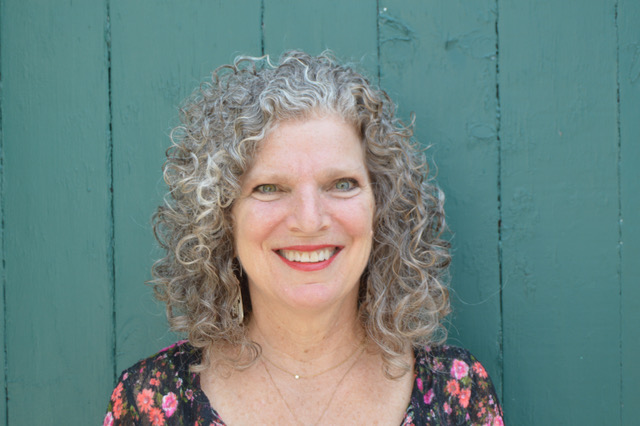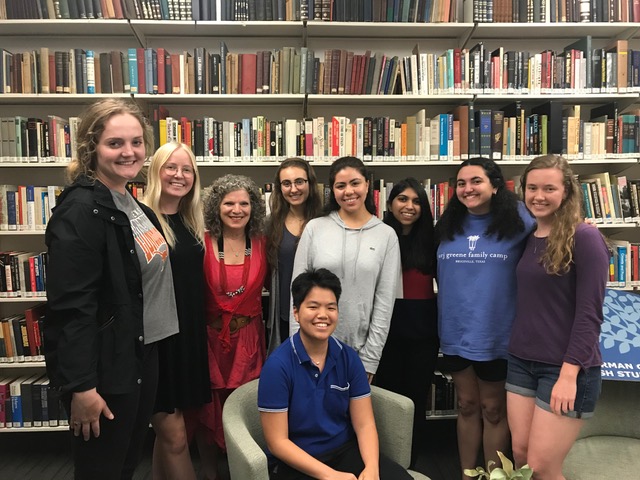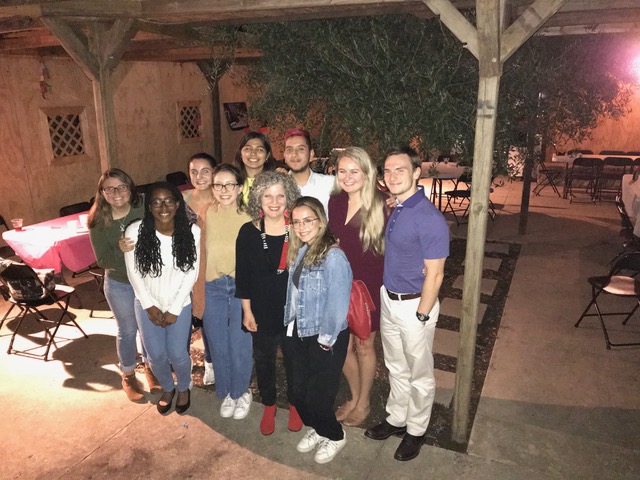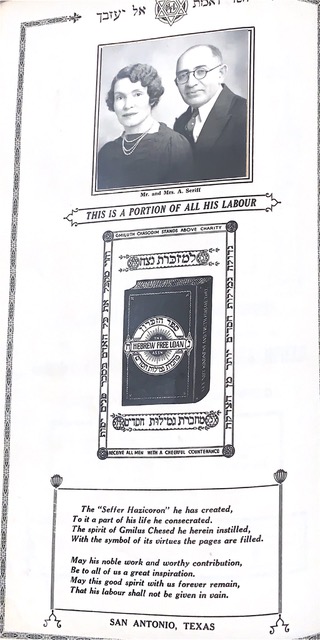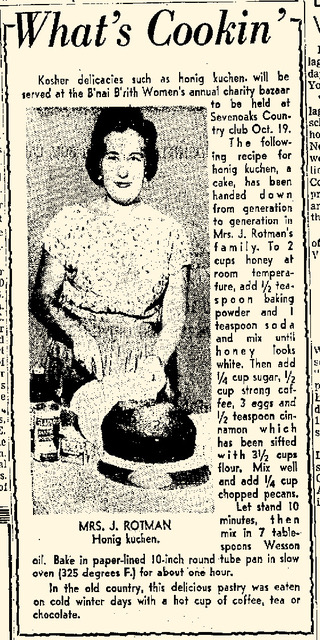From San Antonio to Austin and Beyond. Hebrew Free Loan Associations and Tzedakah, a Family Tradition
By Neena Husid | March 2023
From grandfather to granddaughter, parent to son, and brother to sister, this is a story about how engaging in tzedakah, Hebrew Free Loan style, can spark a renewable family tradition of giving within and beyond the Jewish community. It’s a chronicle dovetailing seamlessly with Hebrew Free Loan of Austin’s central premise regarding the recycling nature of their interest-free loans. Explained simply: when loans granted are paid back, the monies returned are reused for other HFLA borrowers who’ve applied for assistance. But not only do these HFLA funds regenerate into new opportunities, they also possess regeneration-al, properties as well.
For proof of Hebrew Free Loan Association work as a familial contagion, travel no further south than San Antonio where the paternal grandfather of longtime Austin Jewish community member, Dr. Suzanne (Suzy) Seriff will soon be celebrated as one of the founders and major players of HFL-SA during their upcoming 100th anniversary. Readying themselves for this milestone event, local historians, according to Seriff, “have dug up some interesting primary documents about the early days of San Antonio’s HFLA, as well as about my grandfather, who was one of the founders of HFL-SA, the graphic designer of their initial logo, and the creator of a monumental ‘Book of Reminiscences’ for the Association’s 13 year Bar Mitzvah anniversary.” Though Dr. Seriff only knew her grandfather through family lore, tales of Abraham Seriff’s adventuresome, artistic and poetic nature abound; from Russia to Eagle Pass where he was employed as a window dresser for a Jewish-owned department store, and finally to San Antonio. There, he and his wife, Sarah, and their four children, including Suzy’s father, Dr. Aaron Seriff, and Jack Seriff, a beloved and longtime active member of Austin’s Jewish community, lived and thrived. Abraham Seriff was an integral part of the Jewish community and helped found HFL-SA in 1924.
And what a time 1924 was in the country, the South and the world. Seriff, an Associate Professor of Instruction in The University of Texas at Austin’ s Department of Anthropology, as well as the Schusterman Center’s Director of its Arts and Social Justice Internship Program, provided a compressed but chilling historical backdrop to the founding of an aid association 100 years ago. After World War I anti-Semitism was increasing. A newly constituted KKK was targeting Jews and Catholics, along with African and Mexican Americans, and the US passed the Immigration Act of 1924, legislation severely limiting the numbers of eastern and southern Europeans who could take refuge in America. “It was a time of racial and anti-Semitic unrest, Seriff continued, “and my guess is that HFL-SA was founded when it was because Jews needed each other for support and for economic help.”
Thirteen years after its founding Seriff’s grandfather, Abraham, painstakingly designed, and presented the ‘Book of Reminiscences’ to HFL-SA in commemoration of the organization’s Bar Mitzvah year. This recently discovered 50-pound tome, is chocked-full of tributes to those who, like the books author, played a major role in building, and then nurturing, San Antonio’s Hebrew Free Loan Association. David Schulz, the Centennial Celebration consultant for HFLA-SA who has uncovered much of the Association’s early history, as well as photographic proof of Abraham Seriff’s vast contribution of time and talent, poignantly remarked on this Bar Mitzvah year. “I cannot help but imagine what those 13 years were like for the Jewish community here and abroad,” he wrote to Dr. Seriff “Little doubt that many of the loans of the 30’s were made in light of the Great Depression, and likely shifted toward helping families relocate. Obviously, your grandfather played a major role in these developments.”
During conversation for this article, Dr. Seriff mused about the fact that many immigrant groups had aid societies, but the idea of interest-free loans was a hallmark of the type of aid provided within the Jewish community. To further explore this feature of Hebrew Free Loan Associations, she directed attention back to the ‘Book of Reminiscences’ her grandfather had generated. Gazing at a photo of the book, Schulz had forwarded to her, she pointed to the phrase imprinted front and center in English and Hebrew: ’Gmiluth Chasodim (Kindness) over charity.’ This Hebrew Free Loan Association ideal, adapted from Maimonides, the 12th century Jewish philosopher who considered giving without encumbrance to be one of the highest, and kindest forms of aid because it respects the dignity of the borrower. This is a principle Professor Seriff believes in and promulgates.
Teaching the social justice internship program she designed and directs, Seriff draws on Maimonides’ Ladder of Tzedakah, as a foundational lesson in her class. To introduce her students to this graduated concept of giving she often calls on HFLA board members to speak about their work. Dr. Seriff encourages these guests, including HFLA co-founder, Tracy Solomon as well as board members Dana Baruch and Diana Resnik, to describe their personal journeys as Jewish change makers: journeys that have led them to promote the tzedakah and Hebrew Free Loan models in their approach. Students especially appreciate the HFLA notion of ‘giving a hand up rather than a handout’ as exemplifying Maimonides’ highest level of tzedakah. As Rashi wrote, “it takes one person to support something before it falls, but after it falls, five people may not be able to lift it.” (Rashi, Leviticus 25:35)
A 100 years ago, Abraham Seriff pledged his support to HFL-SA as a board member, contributing design work that included a handsome logo, and later the gift of a Bar Mitzvah anniversary tribute book that chronicles the many ways HFL-SA helped build a community through its unencumbered investment in people. Today, his granddaughter continues his legacy of giving in the classroom and beyond.
Pictures and stories highlighting family involvement, and eventual evolvement, continue to be uncovered for HFL-SA’s century celebration. After moving from Ecuador, Joe Rotman, along with his wife, Ella, opened a dry goods business with an HFL-SA interest-free startup loan in 1950. Rotman’s family immersed themselves in San Antonio’s Jewish community where Joe served both as an HFL-SA trustee and a volunteer, dedicated to the success of the loan association’s annual BBQ. Joe and Ella, as well as their children, who were commandeered yearly to help with the event, took great pride in their family’s connection to HFL-SA and to the assistance that first loan provided them in realizing their American Dream.
Michael, one of Rotman’s sons, received his MD from Galveston and opened practice in Austin. Knowing of his family’s deep connection and commitment to HFL-SA, Austin community leaders introduced Dr. Rotman to Tracy Solomon, herself inspired by her brother’s activities with HFLA-Houston. Solomon and Rotman (of blessed memory) co-founded the Hebrew Free Loan Association of Austin in 2011. And so it goes, from generation to generation and from San Antonio to Austin. Proving again and again, that tzedakah given in the manner of Hebrew Free Loan Associations, ignites and inspires. Offering kindness over charity has a lasting effect.
By Neena Husid | March 2023
From grandfather to granddaughter, parent to son, and brother to sister, this is a story about how engaging in tzedakah, Hebrew Free Loan style, can spark a renewable family tradition of giving within and beyond the Jewish community. It’s a chronicle dovetailing seamlessly with Hebrew Free Loan of Austin’s central premise regarding the recycling nature of their interest-free loans. Explained simply: when loans granted are paid back, the monies returned are reused for other HFLA borrowers who’ve applied for assistance. But not only do these HFLA funds regenerate into new opportunities, they also possess regeneration-al, properties as well.
For proof of Hebrew Free Loan Association work as a familial contagion, travel no further south than San Antonio where the paternal grandfather of longtime Austin Jewish community member, Dr. Suzanne (Suzy) Seriff will soon be celebrated as one of the founders and major players of HFL-SA during their upcoming 100th anniversary. Readying themselves for this milestone event, local historians, according to Seriff, “have dug up some interesting primary documents about the early days of San Antonio’s HFLA, as well as about my grandfather, who was one of the founders of HFL-SA, the graphic designer of their initial logo, and the creator of a monumental ‘Book of Reminiscences’ for the Association’s 13 year Bar Mitzvah anniversary.” Though Dr. Seriff only knew her grandfather through family lore, tales of Abraham Seriff’s adventuresome, artistic and poetic nature abound; from Russia to Eagle Pass where he was employed as a window dresser for a Jewish-owned department store, and finally to San Antonio. There, he and his wife, Sarah, and their four children, including Suzy’s father, Dr. Aaron Seriff, and Jack Seriff, a beloved and longtime active member of Austin’s Jewish community, lived and thrived. Abraham Seriff was an integral part of the Jewish community and helped found HFL-SA in 1924.
And what a time 1924 was in the country, the South and the world. Seriff, an Associate Professor of Instruction in The University of Texas at Austin’ s Department of Anthropology, as well as the Schusterman Center’s Director of its Arts and Social Justice Internship Program, provided a compressed but chilling historical backdrop to the founding of an aid association 100 years ago. After World War I anti-Semitism was increasing. A newly constituted KKK was targeting Jews and Catholics, along with African and Mexican Americans, and the US passed the Immigration Act of 1924, legislation severely limiting the numbers of eastern and southern Europeans who could take refuge in America. “It was a time of racial and anti-Semitic unrest, Seriff continued, “and my guess is that HFL-SA was founded when it was because Jews needed each other for support and for economic help.”
Thirteen years after its founding Seriff’s grandfather, Abraham, painstakingly designed, and presented the ‘Book of Reminiscences’ to HFL-SA in commemoration of the organization’s Bar Mitzvah year. This recently discovered 50-pound tome, is chocked-full of tributes to those who, like the books author, played a major role in building, and then nurturing, San Antonio’s Hebrew Free Loan Association. David Schulz, the Centennial Celebration consultant for HFLA-SA who has uncovered much of the Association’s early history, as well as photographic proof of Abraham Seriff’s vast contribution of time and talent, poignantly remarked on this Bar Mitzvah year. “I cannot help but imagine what those 13 years were like for the Jewish community here and abroad,” he wrote to Dr. Seriff “Little doubt that many of the loans of the 30’s were made in light of the Great Depression, and likely shifted toward helping families relocate. Obviously, your grandfather played a major role in these developments.”
During conversation for this article, Dr. Seriff mused about the fact that many immigrant groups had aid societies, but the idea of interest-free loans was a hallmark of the type of aid provided within the Jewish community. To further explore this feature of Hebrew Free Loan Associations, she directed attention back to the ‘Book of Reminiscences’ her grandfather had generated. Gazing at a photo of the book, Schulz had forwarded to her, she pointed to the phrase imprinted front and center in English and Hebrew: ’Gmiluth Chasodim (Kindness) over charity.’ This Hebrew Free Loan Association ideal, adapted from Maimonides, the 12th century Jewish philosopher who considered giving without encumbrance to be one of the highest, and kindest forms of aid because it respects the dignity of the borrower. This is a principle Professor Seriff believes in and promulgates.
Teaching the social justice internship program she designed and directs, Seriff draws on Maimonides’ Ladder of Tzedakah, as a foundational lesson in her class. To introduce her students to this graduated concept of giving she often calls on HFLA board members to speak about their work. Dr. Seriff encourages these guests, including HFLA co-founder, Tracy Solomon as well as board members Dana Baruch and Diana Resnik, to describe their personal journeys as Jewish change makers: journeys that have led them to promote the tzedakah and Hebrew Free Loan models in their approach. Students especially appreciate the HFLA notion of ‘giving a hand up rather than a handout’ as exemplifying Maimonides’ highest level of tzedakah. As Rashi wrote, “it takes one person to support something before it falls, but after it falls, five people may not be able to lift it.” (Rashi, Leviticus 25:35)
A 100 years ago, Abraham Seriff pledged his support to HFL-SA as a board member, contributing design work that included a handsome logo, and later the gift of a Bar Mitzvah anniversary tribute book that chronicles the many ways HFL-SA helped build a community through its unencumbered investment in people. Today, his granddaughter continues his legacy of giving in the classroom and beyond.
Pictures and stories highlighting family involvement, and eventual evolvement, continue to be uncovered for HFL-SA’s century celebration. After moving from Ecuador, Joe Rotman, along with his wife, Ella, opened a dry goods business with an HFL-SA interest-free startup loan in 1950. Rotman’s family immersed themselves in San Antonio’s Jewish community where Joe served both as an HFL-SA trustee and a volunteer, dedicated to the success of the loan association’s annual BBQ. Joe and Ella, as well as their children, who were commandeered yearly to help with the event, took great pride in their family’s connection to HFL-SA and to the assistance that first loan provided them in realizing their American Dream.
Michael, one of Rotman’s sons, received his MD from Galveston and opened practice in Austin. Knowing of his family’s deep connection and commitment to HFL-SA, Austin community leaders introduced Dr. Rotman to Tracy Solomon, herself inspired by her brother’s activities with HFLA-Houston. Solomon and Rotman (of blessed memory) co-founded the Hebrew Free Loan Association of Austin in 2011. And so it goes, from generation to generation and from San Antonio to Austin. Proving again and again, that tzedakah given in the manner of Hebrew Free Loan Associations, ignites and inspires. Offering kindness over charity has a lasting effect.

